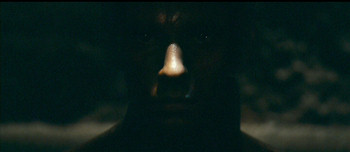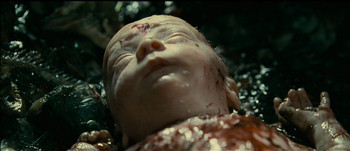Perfume: The Story of a Murderer
 The contradictions of director/co-writer/composer Tom Tykwer’s Perfume: The Story of a Murderer start in the title, with the onomatopoeic softness and ether of a single word paired with a morbid, blunt descriptive subtitle.
The contradictions of director/co-writer/composer Tom Tykwer’s Perfume: The Story of a Murderer start in the title, with the onomatopoeic softness and ether of a single word paired with a morbid, blunt descriptive subtitle.
Both components are drawn from the novel by Patrick Süskind, but the associations that pile up and pull at each other during the movie’s opening scenes are equally Tykwer’s, cinematic and lovingly ambiguous. The main character is introduced by his nose emerging from the darkness, deeply but measuredly drawing in all that the air carries. There’s something refined in the control of the gesture, yet it recalls vermin assessing its surroundings. Normal humans treat smell as a secondary sense.
He is dragged in chains to a balcony in front of a ravenous mob, and is sentenced to a brutal crucifixion for a crime that is never stated. Yet he appears physically meek, and his intense expression offers wonder but no fear. His name is read – this is perfume journeyman Jean-Baptiste Grenouille – along with his fate, and the religious overtones are undeniable. The story of Jesus and Barabbas leaps to mind, of an innocent – perhaps even the divine – sacrificed to spare the life of the monstrous; the pure must die to save the sinner.
Yet the certain tones of narrator John Hurt – here, as in Dogville, working at cross-purposes with what’s shown on the screen – attempt to disabuse us of messianic thoughts, assuring us of Jean-Baptiste’s wickedness. And a little later, in recounting the story of the convicted man’s birth, the narrator goes so far as to crown the infant with the responsibility for his mother’s execution, even though the woman clearly wrote her own sentence. This boy, the narrator seems to be saying, was born trailing a wake of death.
In its first minutes – explored in the accompanying audio commentary (part of Culture Snob’s Five Minutes series; download it.) – Tykwer establishes an empathy and sympathy with Jean-Baptiste that he spends most of the film’s remainder undermining. But as the movie reaches its climax, he draws on those connections – or maybe just the memory of them – to open the door for the possibility that Jean-Baptiste is, indeed, some sort of savior. Perhaps the evil and the heavenly coexist in this body.
So far, I’ve merely alluded to the conceit of Perfume, because it’s such a good one – and executed so well – that it might obscure the movie’s moral aspects. Jean-Baptiste was born with a superhumanly keen olfactory sense and, in his pursuit of physically preserving smells, becomes a killer.
What that summary doesn’t convey is Perfume’s curiosity about the limits of audience empathy and its explorations of the power of beauty and the ethics of creating it. Fundamentally, the book and movie both wonder whether an object of almost infinite aesthetic value can and should be crafted, and whether the good of its existence can outweigh the price of its production. Framed less academically, Perfume asks about the value of art.
You only need to compare a few snippets of the opening and closing voice-over narration to the novel to recognize that Perfume is largely a faithful adaptation; Tykwer has not re-imagined the work, but the difficult translation into a movie is startlingly executed. (Stanley Kubrick and Martin Scorsese reportedly thought the novel unfilmable.) The images don’t exactly evoke smells, but they’re vivid, sensual expressions of the acute experience of smelling. Texture, color, and an implicit command to be more aware of scent are effective substitutes for Smell-O-Vision.
 The newborn Jean-Baptiste is intercut, for example, with momentary flashes of the filth and foul fish and people around him, and the infant’s unnatural alertness is profoundly unsettling. Later scenes beautifully illustrate how much Jean-Baptiste has developed and refined this sense, but here Tykwer finds the perfect detail, that little moment of understanding that something is deeply off.
The newborn Jean-Baptiste is intercut, for example, with momentary flashes of the filth and foul fish and people around him, and the infant’s unnatural alertness is profoundly unsettling. Later scenes beautifully illustrate how much Jean-Baptiste has developed and refined this sense, but here Tykwer finds the perfect detail, that little moment of understanding that something is deeply off.
The narrator notes that Jean-Baptiste was greedy. He wanted to drink in all the scents the world had to offer, and didn’t distinguish between “good” and “bad” smells. But he’s enchanted by the air of a young woman, and he becomes obsessed with capturing the human essence in oil – with the ultimate goal of constructing a perfume of nearly unbearable beauty.
In Ben Whishaw, Tykwer has a Jean-Baptiste with an alien placidity distinct from the dead eyes, the unhinged rage, or sly malevolence that we typically associate with evil in cinema. He’s not immoral or even amoral; his ethics value the perfect scent above all else.
And his dogged pursuit is, in the end, at least partially sanctioned by Perfume. Süskind’s book and Tykwer’s movie capitalize on the understanding that the fleeting, largely irreproducible nature of smell gives it tremendous power. And if one could bottle thirteen gorgeous young women – with special attention paid to the redheads – could that fragrance not have a terrifying potency, and perhaps even lead to nirvana?
Perfume poses a more interesting question, though, one invoked in those early minutes through incongruous religious references and near the end as Jean-Baptiste stands before the crowd, in a royal-blue outfit, waiting to be executed. If a work of art existed that was so gorgeous it could turn bloodlust into love, mightn’t the cost – no matter how high – be worth it?

